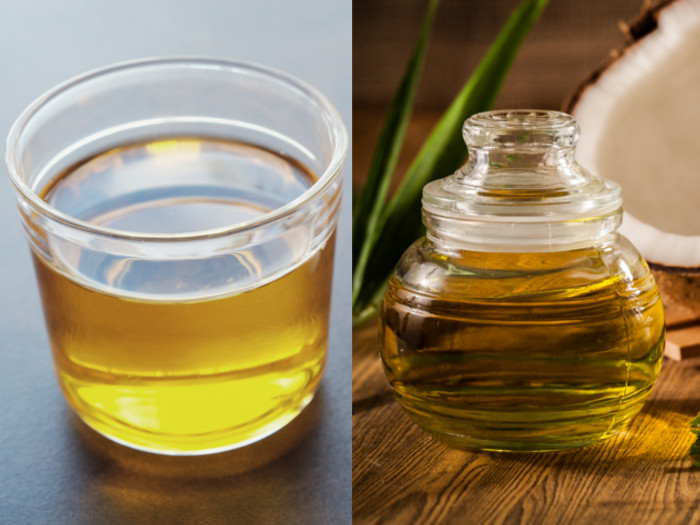MCT oil is the acronym for medium-chain triglyceride oils, which are found in coconut oil, and consist of four different fatty acids – caproic, capric, caprylic and lauric acids. These medium-chain fatty acids have experienced a surge in popularity and attention as of late, since it has been discovered that eliminating fat from the diet is actually not a healthy way to live. As most of you reading this likely know, there are good forms of fat and bad forms of fat, but understanding the difference, and where to find them, is crucial to your health.
As per the USDA, coconut oil is a good source of lipids, energy and various nutrients. Medium-chain and long-chain triglycerides are the most commonly discussed types of saturated fats, and the medium and long refer to the amount of carbons on their chain. For example, MCTs have 6, 8, 10 or 12 carbons, whereas LCTs have 14-22 carbons. This difference on the atomic scale actually has a major effect on how the body processes these acids, and what effects they can have on the body. For many years, any type of saturated fat was considered a risk factor for heart disease and obesity, when in reality, medium-chain fatty acids can help with weight loss, metabolic functioning, the immune system, oxidative stress and a laundry list of other benefits. [1] [2]
When these MCTs are processed by the liver and directly converted into energy, they release ketones, which can affect mitochondrial function to boost energy, and even show some evidence of being able to counteract cognitive disorders. [3]
MCT oil is simply a concentrated dose of those beneficial fatty acids, without the long-chain fatty acids that so many other types of vegetable and cooking oils contain, including coconut oil. Interestingly enough, although lauric acid is technically considered a medium-chain fatty acid by chemists, it doesn’t behave (biologically speaking) the same as capric, caprylic and caproic acids. Lauric acid is the C-12 MCT, meaning that it has 12 carbons on its chain, and is closer to a long-chain fatty acid than the “true” MCTs.
Now, let’s take a closer look at these MCTs. [4]
C-6 Caproic Acid – As the smallest of the medium-chain fatty acids, this is also one that isn’t particularly pleasant to consume. While it can give a definite cognitive boost to the brain, it is also linked to gastrointestinal distress, throat irritation and other unpleasant side effects. In coconut oil, it is the MCT of the smallest percentage.

Coconut oil and mct oil can both be beneficial, but for different purposes. Photo Credit: Shutterstock
C-8 Caprylic Acid – Linked to directly improving energy metabolism, this is found in relatively small amounts in coconut oil, between 6-8%.
C-10 Capric Acid – Like the other MCTs on this list, capric acid can easily be converted directly into ATP, rather than being stored as fat, and makes up approximately 10% of coconut oil, slightly higher than caprylic acid.
C-12 Lauric Acid – Composing between 40-50% of coconut oil, this MCT is unique in that it does require a few extra steps to be converted into energy, but not nearly as many steps as a simple carbohydrate or traditional long-chain fatty acid.
In recent years, many people are seeking out MCT oil for a pure dose of metabolism-boosting energy, a jumpstart to their immune system, a weight-loss aid, and a means to counteract oxidative stress and the cognitive decline of aging.
Difference Between Coconut Oil and MCT Oil
Coconut oil contains high levels of medium-chain triglycerides (MCTs), whereas MCT oil is a pure concentrated form of those beneficial fatty acids. Considering that the MCTs found in coconut oil provide a number of key health benefits, MCT oil will be superior to coconut oil when it comes to treating those health conditions. [5]
If you buy MCT oil, you will only be consuming C-6 (in small amounts), C-8, C-10 and C-12, whereas if you are eating coconut oil, you will also get a dose of stearic acid, oleic acid and linoleic acids (all C-18). While these last three are technically long-chain fatty acids, your body does still need them in smaller amounts, and they do provide a source of energy. [6]
Coconut oil also contains small amounts of vitamin E and vitamin K, certain polyphenolic compounds, and low levels of iron. MCT oil is a pure substance, so any of those additional antioxidant effects of coconut oil, particularly those that affect the skin and hair, would not be present in pure MCT oil.
Furthermore, MCT oil is slightly harder to classify, and it is more difficult to determine precisely what acids are present in what amounts. MCT oil requires more refining to produce a liquid oil, which often means more chemical processing, or the complete removal of lauric acid, which does have certain benefits, in its own right. Some of the less expensive varieties of MCT oil even have filler oils, such as omega-6 fatty acids or polyunsaturated fats. [7]
If you purchase virgin organic coconut oil, you know what you are getting, in rather precise percentages. There will be some variation in the polyunsaturated fat content based on where the coconut is grown (e.g., soil quality, environment etc.), but there is not much left up to chance. [8]
Overall, both of these oils can be used for specific purposes, and both should be considered near the top of the list for healthy oils. MCT oil is a more concentrated form of these fatty acids, with a narrower list of health effects, while coconut oil can affect our health in more diverse ways, but perhaps not as strongly.
